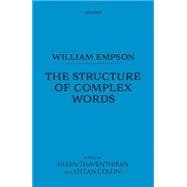This is the first scholarly edition of one of the classics of literary criticism. William Empson was among the two or three most important and influential literary critics and theorists of the twentieth century. He has long been celebrated as one of the most fertile (as well as one of the funniest) explorers of how meaning works in language, especially in poetry. The Structure of Complex Words (1951) was much his longest book and was intended as a major theoretical statement of his contribution to the subject. Since its publication, it has been constantly referred to, but usually from a respectful distance, since it can seem a forbidding and difficult work.
This edition provides an extensive introduction together with full critical and explanatory notes. The editors trace the book's genesis and development in detail, beginning with Empson's collaboration with I. A. Richards in the early and mid-1930s, and concluding with the extensive writing and re-writing that Empson undertook while in Peking in 1947-50. This edition also reprints a selection of materials (including articles and letters) that illuminate Empson's thinking and contributed to the eventual book. The edition makes Empson's great work more intelligible to a range of readers and will immediately become the standard version of this celebrated text.








